19 results
9 - The Sunni Legal Tradition: An Overview of Pluralism, Formalism, and Reform
- from Part II - The Concept of Tradition
-
-
- Book:
- A Cosmopolitan Jurisprudence
- Published online:
- 10 December 2021
- Print publication:
- 16 December 2021, pp 180-201
-
- Chapter
- Export citation
Contents
-
- Book:
- Child Custody in Islamic Law
- Published online:
- 30 July 2018
- Print publication:
- 09 August 2018, pp vii-vii
-
- Chapter
- Export citation
Part I - Child Custody and Guardianship in Comparative Perspective
-
- Book:
- Child Custody in Islamic Law
- Published online:
- 30 July 2018
- Print publication:
- 09 August 2018, pp 27-108
-
- Chapter
- Export citation
Dedication
-
- Book:
- Child Custody in Islamic Law
- Published online:
- 30 July 2018
- Print publication:
- 09 August 2018, pp v-vi
-
- Chapter
- Export citation
2 - The Best Interests of the Child in Islamic Juristic Discourse
- from Part I - Child Custody and Guardianship in Comparative Perspective
-
- Book:
- Child Custody in Islamic Law
- Published online:
- 30 July 2018
- Print publication:
- 09 August 2018, pp 56-108
-
- Chapter
- Export citation
5 - Child Custody in Egypt, 1801–1929
- from Part III - The Transition into Modernity
-
- Book:
- Child Custody in Islamic Law
- Published online:
- 30 July 2018
- Print publication:
- 09 August 2018, pp 165-191
-
- Chapter
- Export citation
6 - Twentieth- and Twenty-First-Century Child Custody, 1929–2014
- from Part III - The Transition into Modernity
-
- Book:
- Child Custody in Islamic Law
- Published online:
- 30 July 2018
- Print publication:
- 09 August 2018, pp 192-228
-
- Chapter
- Export citation
3 - Private Separation Deeds in Action
- from Part II - Ottoman-Egyptian Practice, 1517–1801
-
- Book:
- Child Custody in Islamic Law
- Published online:
- 30 July 2018
- Print publication:
- 09 August 2018, pp 111-133
-
- Chapter
- Export citation
1 - Child Custody in Civil and Common Law Jurisdictions
- from Part I - Child Custody and Guardianship in Comparative Perspective
-
- Book:
- Child Custody in Islamic Law
- Published online:
- 30 July 2018
- Print publication:
- 09 August 2018, pp 29-55
-
- Chapter
- Export citation
4 - Ottoman Juristic Discourse in Action, 1517–1801
- from Part II - Ottoman-Egyptian Practice, 1517–1801
-
- Book:
- Child Custody in Islamic Law
- Published online:
- 30 July 2018
- Print publication:
- 09 August 2018, pp 134-162
-
- Chapter
- Export citation
Part III - The Transition into Modernity
-
- Book:
- Child Custody in Islamic Law
- Published online:
- 30 July 2018
- Print publication:
- 09 August 2018, pp 163-228
-
- Chapter
- Export citation
Acknowledgments
-
- Book:
- Child Custody in Islamic Law
- Published online:
- 30 July 2018
- Print publication:
- 09 August 2018, pp viii-x
-
- Chapter
- Export citation
Bibliography
-
- Book:
- Child Custody in Islamic Law
- Published online:
- 30 July 2018
- Print publication:
- 09 August 2018, pp 239-256
-
- Chapter
- Export citation
Introduction
-
- Book:
- Child Custody in Islamic Law
- Published online:
- 30 July 2018
- Print publication:
- 09 August 2018, pp 1-26
-
- Chapter
- Export citation
Part II - Ottoman-Egyptian Practice, 1517–1801
-
- Book:
- Child Custody in Islamic Law
- Published online:
- 30 July 2018
- Print publication:
- 09 August 2018, pp 109-162
-
- Chapter
- Export citation
Conclusion
-
- Book:
- Child Custody in Islamic Law
- Published online:
- 30 July 2018
- Print publication:
- 09 August 2018, pp 229-238
-
- Chapter
- Export citation
Index
-
- Book:
- Child Custody in Islamic Law
- Published online:
- 30 July 2018
- Print publication:
- 09 August 2018, pp 257-266
-
- Chapter
- Export citation
Copyright page
-
- Book:
- Child Custody in Islamic Law
- Published online:
- 30 July 2018
- Print publication:
- 09 August 2018, pp iv-iv
-
- Chapter
- Export citation

Child Custody in Islamic Law
- Theory and Practice in Egypt since the Sixteenth Century
-
- Published online:
- 30 July 2018
- Print publication:
- 09 August 2018



